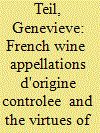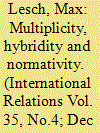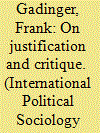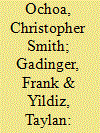|
|
|
Sort Order |
|
|
|
Items / Page
|
|
|
|
|
|
|
| Srl | Item |
| 1 |
ID:
095007


|
|
|
|
|
| Publication |
2010.
|
| Summary/Abstract |
There is something highly paradoxical about the French wine Appellations d'Origine Contrôlées (AOCs): the more they are considered to be suspect, the more they expand to other countries and products! Since their invention they have been suspected of not conveying reliable information. At the same time, supporters of quality wine have prayed for the development of a quality wine market and seen the suspicions concerning them as a threat that these actors have collectively tried to answer. But neither the accusation nor the defence has managed to close the debate. Accusation after accusation, the assessors acknowledgement of being able to define quality have changed, as has quality itself and the role given to AOCs. Far from sweeping away the old procedures, the new solutions have cohabited with them, transforming the wine market into a complex market hosting hundreds of thousands of brands and a variety of uses of quality signs by wine drinkers. Finally, contrary to most economists' fears, neither AOCs nor quality itself work by imposing themselves on the market actors. The greatest strength of AOCs may not be an ability to deceive consumers, but their capacity to raise doubts and to trigger considerable efforts by their defenders to quieten them.
|
|
|
|
|
|
|
|
|
|
|
|
|
|
|
|
| 2 |
ID:
182570


|
|
|
|
|
| Summary/Abstract |
In 2014, Germany became the 173rd state to ratify the UN Convention against Corruption (UNCAC) – after more than ten years of disputes in the German parliament. To make sense of the protracted debates about ratifying UNCAC, the article follows the recent introduction of Luc Boltanski’s pragmatic sociology to International Relations (IR). I argue that this approach opens new avenues for researching normativity in hybrid arrangements of multiple, overlapping orders of worth and through ongoing tests of the right evaluation of a situation. I show that the belayed ratification of UNCAC in Germany was the result of the hybridity inherent to norms against corruption. In the debates, members of the German parliament relied on competing normative inventories to translate the term ‘public official’ to the German context and to settle the meaning of corruption. This article contributes to IR norm research by unpacking normative multiplicity and contradictions that undergird international norms and disputes about them.
|
|
|
|
|
|
|
|
|
|
|
|
|
|
|
|
| 3 |
ID:
147938


|
|
|
|
|
| Summary/Abstract |
Luc Boltanski is one of the most important contemporary social theorists. Whether and how his sociology matters for International Relations (IR) theory has, so far, not been explored. Boltanski’s work, as this article demonstrates, can greatly advance international political sociology by further developing a practice theoretical account which reconciles Bruno Latour’s Actor-Network Theory and Pierre Bourdieu’s praxeology. Boltanski’s pragmatic sociology is mainly inspired by pragmatism and ethnomethodology, but it is still concerned with sociology as a critical project of emancipation. He aims to renew critical sociology by focusing on the ‘critical capacities’ ordinary actors use in disputes and controversies of political life. Practices of justification and critique as triggers of conflicts and sources of agreements are consequently the subjects of analysis. This implies, furthermore, a strong notion of normativity in practice, which reveals a blind spot in current debates in IR. Justification becomes a social practice through which diverging legitimacy claims are tested under conditions of uncertainty. Such a view is conceptually and methodologically relevant for IR scholars interested in contested norms, moral ambiguity, and the fragile character of political reality. Considering Boltanski’s work broadens the empirical scope of practice theory and provides promising new directions for IR theory.
|
|
|
|
|
|
|
|
|
|
|
|
|
|
|
|
| 4 |
ID:
178503


|
|
|
|
|
| Summary/Abstract |
Current debates about surveillance demonstrate the complexity of political controversies whose uncertainty and moral ambiguities render normative consensus difficult to achieve. The question of how to study political controversies remains a challenge for IR scholars. Critical security studies scholars have begun to examine political controversies around surveillance by exploring changing security practices in the everyday. Yet, (de)legitimation practices have hitherto not been the focus of analysis. Following recent practice-oriented research, we develop a conceptual framework based on the notion of ‘narrative legitimation politics’. We first introduce the concept of ‘tests’ from Boltanski's pragmatic sociology to categorise the discursive context and different moral reference points (truth, reality, existence). Second, we combine pragmatic sociology with narrative analysis to enable the study of dominant justificatory practices. Third, we develop the framework through a practice-oriented exploration of the Snowden controversy with a focus on the US and Germany. We identify distinct justificatory practices in each test format linked to narrative devices (for example, plots, roles, metaphors) whose fluid, contested dynamics have the potential to effect change. The framework is particularly relevant for IR scholars interested in legitimacy issues, the normativity of practices, and the power of narratives.
|
|
|
|
|
|
|
|
|
|
|
|
|
|
|
|
|
|
|
|
|